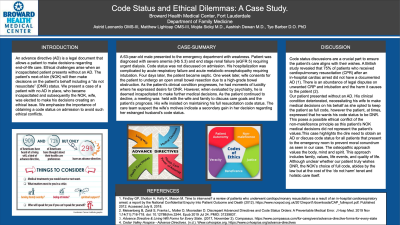Back

Health Policy
Code status and ethical dilemmas: A case study
Friday, March 31, 2023
12:00 PM East Coast USA Time


Astrid C. Leonardo, n/a
OMS-III
Nova Southeastern University
PEMBROKE PINES, Florida, United States
Presenting Author(s)
Introduction: An advance directive (AD) is a legal document that allows a patient to make decisions regarding end-of-life care. Ethical challenges arise when an incapacitated patient presents without an AD. The patient’s next-of-kin (NOK) will then make decisions on the patient’s behalf including a “do not resuscitate” (DNR) status. We present a case of a patient with no AD in place, who became incapacitated and subsequently the NOK, wife, was elected to make his decisions creating an ethical issue. We emphasize the importance of obtaining a code status on admission to avoid such ethical conflicts.
Case Study: A 63-year-old male presented to the emergency department with weakness. The patient was diagnosed with severe anemia, and acute renal failure requiring urgent dialysis. Code status was not discussed on admission. His hospitalization was complicated by acute respiratory failure and acute metabolic encephalopathy requiring intubation. As the patient’s clinical condition improved, he had moments of lucidity where he expressed desire for DNR. However, when evaluated by psychiatry, he is deemed incapacitated to make further medical decisions. His wife insisted on maintaining his full resuscitation code status. The care team suspects the wife’s motives indicate a secondary gain in her decision regarding her estranged husband’s code status.
Discussion: Code status discussions are a crucial part to ensure the patient’s care aligns with their wishes. A British study revealed that 75% of patients who received cardiopulmonary resuscitation (CPR) after an in-hospital cardiac arrest did not have a documented AD (1). There is an abundance of legal disputes on unwanted CRP and intubation and the harm it causes to the patient (2). Our patient presented without an AD. His clinical condition deteriorated, necessitating his wife to make medical decisions on his behalf as she opted to keep the patient as full code, however the patient, at times, expressed that he wants his code status to be DNR. This poses a possible ethical conflict of the non-maleficence principle as this patient’s NOK medical decisions did not represent the patient’s values. This case highlights the dire need to obtain an AD or discuss code status for all patients that present to the emergency room to prevent this moral conundrum. The osteopathic approach values the body, mind, and spirit. Although unclear whether our patient truly wishes DNR, the NOK’s choice of full code abides by the law but at the cost of the ‘do not harm’ tenet and holistic care itself.
Case Study: A 63-year-old male presented to the emergency department with weakness. The patient was diagnosed with severe anemia, and acute renal failure requiring urgent dialysis. Code status was not discussed on admission. His hospitalization was complicated by acute respiratory failure and acute metabolic encephalopathy requiring intubation. As the patient’s clinical condition improved, he had moments of lucidity where he expressed desire for DNR. However, when evaluated by psychiatry, he is deemed incapacitated to make further medical decisions. His wife insisted on maintaining his full resuscitation code status. The care team suspects the wife’s motives indicate a secondary gain in her decision regarding her estranged husband’s code status.
Discussion: Code status discussions are a crucial part to ensure the patient’s care aligns with their wishes. A British study revealed that 75% of patients who received cardiopulmonary resuscitation (CPR) after an in-hospital cardiac arrest did not have a documented AD (1). There is an abundance of legal disputes on unwanted CRP and intubation and the harm it causes to the patient (2). Our patient presented without an AD. His clinical condition deteriorated, necessitating his wife to make medical decisions on his behalf as she opted to keep the patient as full code, however the patient, at times, expressed that he wants his code status to be DNR. This poses a possible ethical conflict of the non-maleficence principle as this patient’s NOK medical decisions did not represent the patient’s values. This case highlights the dire need to obtain an AD or discuss code status for all patients that present to the emergency room to prevent this moral conundrum. The osteopathic approach values the body, mind, and spirit. Although unclear whether our patient truly wishes DNR, the NOK’s choice of full code abides by the law but at the cost of the ‘do not harm’ tenet and holistic care itself.
